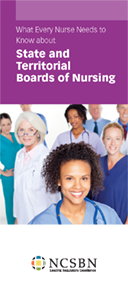
Licensure is the process by which boards of nursing grant permission to an individual to engage in nursing practice after determining that the applicant has attained the competency necessary to perform a unique scope of practice. Licensure is necessary when the regulated activities are complex and require specialized knowledge and skill and independent decision making. The licensure process determines if the applicant has the necessary skills to safely perform a specified scope of practice by predetermining the criteria needed and evaluating licensure applicants to determine if they meet the criteria.
To begin the licensure process, search the particular state board of nursing website for applications.
The responsibilities of a licensed nurse include knowledge of, and adherence to, the laws and rules which govern nursing as outlined in the nurse practice act and regulations. Review the nursing law and rules by locating your state nurse practice act and regulations.

While the majority of nurses are honest, competent and caring individuals, there are occasional opportunists who fraudulently cover up their backgrounds to advance their education or seek employment. This paper provides nurse educators and employers with recommendations for identifying fraud when they review nurse applications and transcripts for advanced study, employment, certification or other uses.

This brochure offers nurses an explanation of what boards of nursing (BONs) do for the profession and those who work in it. This brochure provides information regarding: